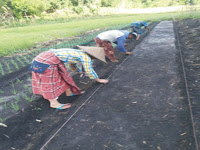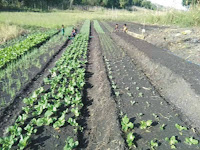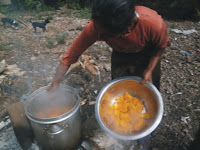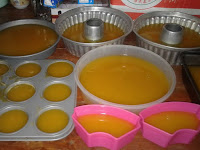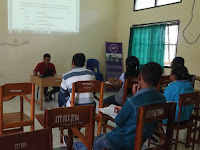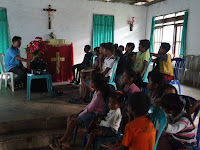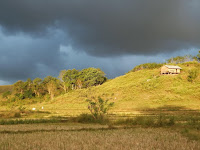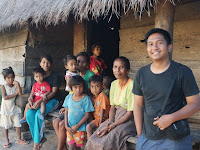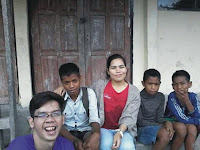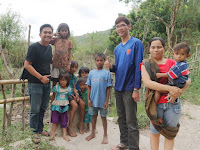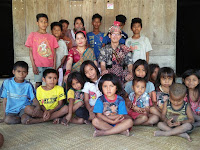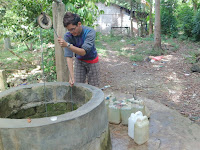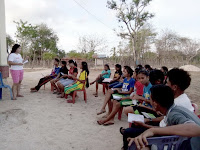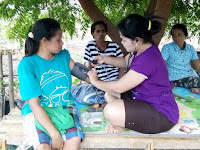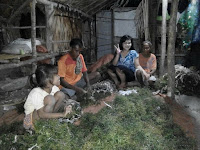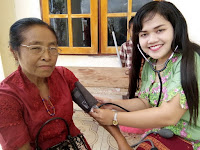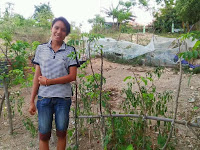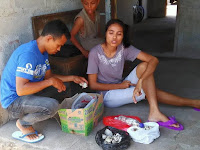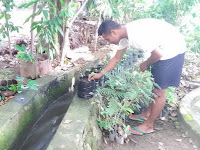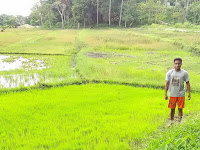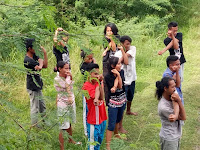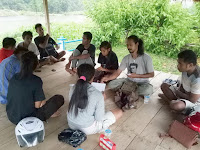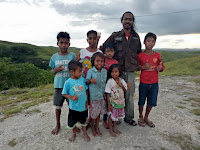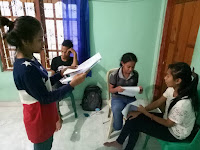Monday, 12 December 2016
by adminstube
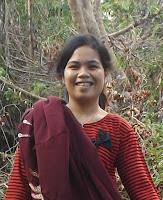 The first is Junita Samosir, a graduated agrotechnology student of Mercu Buana Yogyakarta University. In Sumba, she shared her knowledge about the cultivation of organic vegetables to people in Laimbonga, East Sumba. She held practices making pilot garden involving the local people, also observed land availability, land preparation, seed preparation and watering until the treatment of plants. It is nearly one month to harvest it along with the local people. In addition, Junita also trained some woman to process yellow pumpkins into pudding because of its very high nutrient, especially as a source of carbohydrates, vitamins and minerals. The people were so excited to process pumpkin because it is usually served as boiled food or for their pigs feed.
The first is Junita Samosir, a graduated agrotechnology student of Mercu Buana Yogyakarta University. In Sumba, she shared her knowledge about the cultivation of organic vegetables to people in Laimbonga, East Sumba. She held practices making pilot garden involving the local people, also observed land availability, land preparation, seed preparation and watering until the treatment of plants. It is nearly one month to harvest it along with the local people. In addition, Junita also trained some woman to process yellow pumpkins into pudding because of its very high nutrient, especially as a source of carbohydrates, vitamins and minerals. The people were so excited to process pumpkin because it is usually served as boiled food or for their pigs feed.
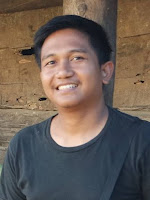 The second is Resky Julius, a Management student of Duta Wacana Christian University. He is coming from Toraja, Sulawesi. There were two activities he did in Sumba, that is, sharing the experience how to write curriculum vitae with students of STT GKS and documenting a variety of interesting things in Sumba, such as culture, crafts and natural landscapes. Curriculum Vitae is important as a form of personal preparation for entering the job world as well as creating employment opportunities.
The second is Resky Julius, a Management student of Duta Wacana Christian University. He is coming from Toraja, Sulawesi. There were two activities he did in Sumba, that is, sharing the experience how to write curriculum vitae with students of STT GKS and documenting a variety of interesting things in Sumba, such as culture, crafts and natural landscapes. Curriculum Vitae is important as a form of personal preparation for entering the job world as well as creating employment opportunities.
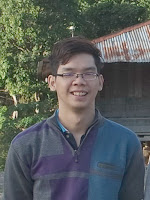 The third participant is Christian Badai Bulin, an Information Technology Student of Duta Wacana Christian University. He comes from Pontianak, West Kalimantan. He made a couple of short videos telling about Sumba, such as Marapu customary burial, the atmosphere of one beach in Sumba and processions using traditional clothe. He hoped that the short videos can be used as documentation and tourism promotion in Sumba.
The third participant is Christian Badai Bulin, an Information Technology Student of Duta Wacana Christian University. He comes from Pontianak, West Kalimantan. He made a couple of short videos telling about Sumba, such as Marapu customary burial, the atmosphere of one beach in Sumba and processions using traditional clothe. He hoped that the short videos can be used as documentation and tourism promotion in Sumba.
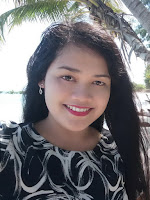 The Sumbanese’s health condition became the concern of Imelda Dewi Susanti, from Sekadau, West Kalimantan, as the fourth participant. She is a graduate student from Health Institute of Bethesda Yogyakarta. She shared her experiences with the local community and the congregation members of GKS Kaliuda, East Sumba, to recognize the hereditary diseases (hypertension and diabetes mellitus) and the treatment including herbal beverage by processing pumpkins. In addition, she also taught people how to have a clean and healthy lifestyle, checked blood pressure and did gymnastic together with young people in Kaliuda.
The Sumbanese’s health condition became the concern of Imelda Dewi Susanti, from Sekadau, West Kalimantan, as the fourth participant. She is a graduate student from Health Institute of Bethesda Yogyakarta. She shared her experiences with the local community and the congregation members of GKS Kaliuda, East Sumba, to recognize the hereditary diseases (hypertension and diabetes mellitus) and the treatment including herbal beverage by processing pumpkins. In addition, she also taught people how to have a clean and healthy lifestyle, checked blood pressure and did gymnastic together with young people in Kaliuda.
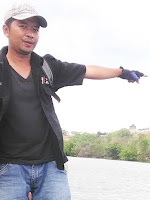 The fifth participant is Yohanes Dian Alpasa, a theology alumnus of Duta Wacana Christian University. He is from Bengkulu, Sumatera. He met and interviewed some activists of Stube-HEMAT Sumba who participated Exposure to Stube-HEMAT Yogyakarta in the period of 2010-2016. It is done to find out whether the program was beneficial and applicable in their origin area. Twenty-nine participants were interviewed directly, nine persons were interviewed by phone and two persons could not be interviewed becuase they worked in different island.
The fifth participant is Yohanes Dian Alpasa, a theology alumnus of Duta Wacana Christian University. He is from Bengkulu, Sumatera. He met and interviewed some activists of Stube-HEMAT Sumba who participated Exposure to Stube-HEMAT Yogyakarta in the period of 2010-2016. It is done to find out whether the program was beneficial and applicable in their origin area. Twenty-nine participants were interviewed directly, nine persons were interviewed by phone and two persons could not be interviewed becuase they worked in different island.
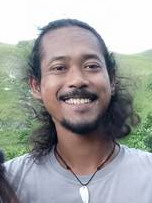 The sixth participant is Vicky Tri Samekto, a theological graduated student of Christian Institute of Marturia, Yogyakarta. With his theatrical skill, Vicky tried to encourage and to provide a forum for young people to express themselves through their voice and body. The theater exercises became simple practices of self-expression. Of course, the expression issued was related to social theme and young children.
The sixth participant is Vicky Tri Samekto, a theological graduated student of Christian Institute of Marturia, Yogyakarta. With his theatrical skill, Vicky tried to encourage and to provide a forum for young people to express themselves through their voice and body. The theater exercises became simple practices of self-expression. Of course, the expression issued was related to social theme and young children.
by adminstube
Exploring Sumba 2016
Share Experience and Mutual Learning
A trip to visit a new area in order to know the people and culture is a precious opportunity. Moreover, the opportunity to interact and to learn with the local community about the diversity in Indonesia is so worthy. Stube-HEMAT Yogyakarta provides an opportunity for students and its activists to visit Sumba, a small island in East Nusa Tenggara. Not everyone can visit Sumba to enjoy the natural beauty, unique culture and society.
There are some students who dare to accept the challenge of venturing Sumba to share their knowledge and skills. Who are they?
 The first is Junita Samosir, a graduated agrotechnology student of Mercu Buana Yogyakarta University. In Sumba, she shared her knowledge about the cultivation of organic vegetables to people in Laimbonga, East Sumba. She held practices making pilot garden involving the local people, also observed land availability, land preparation, seed preparation and watering until the treatment of plants. It is nearly one month to harvest it along with the local people. In addition, Junita also trained some woman to process yellow pumpkins into pudding because of its very high nutrient, especially as a source of carbohydrates, vitamins and minerals. The people were so excited to process pumpkin because it is usually served as boiled food or for their pigs feed.
The first is Junita Samosir, a graduated agrotechnology student of Mercu Buana Yogyakarta University. In Sumba, she shared her knowledge about the cultivation of organic vegetables to people in Laimbonga, East Sumba. She held practices making pilot garden involving the local people, also observed land availability, land preparation, seed preparation and watering until the treatment of plants. It is nearly one month to harvest it along with the local people. In addition, Junita also trained some woman to process yellow pumpkins into pudding because of its very high nutrient, especially as a source of carbohydrates, vitamins and minerals. The people were so excited to process pumpkin because it is usually served as boiled food or for their pigs feed. The second is Resky Julius, a Management student of Duta Wacana Christian University. He is coming from Toraja, Sulawesi. There were two activities he did in Sumba, that is, sharing the experience how to write curriculum vitae with students of STT GKS and documenting a variety of interesting things in Sumba, such as culture, crafts and natural landscapes. Curriculum Vitae is important as a form of personal preparation for entering the job world as well as creating employment opportunities.
The second is Resky Julius, a Management student of Duta Wacana Christian University. He is coming from Toraja, Sulawesi. There were two activities he did in Sumba, that is, sharing the experience how to write curriculum vitae with students of STT GKS and documenting a variety of interesting things in Sumba, such as culture, crafts and natural landscapes. Curriculum Vitae is important as a form of personal preparation for entering the job world as well as creating employment opportunities. The third participant is Christian Badai Bulin, an Information Technology Student of Duta Wacana Christian University. He comes from Pontianak, West Kalimantan. He made a couple of short videos telling about Sumba, such as Marapu customary burial, the atmosphere of one beach in Sumba and processions using traditional clothe. He hoped that the short videos can be used as documentation and tourism promotion in Sumba.
The third participant is Christian Badai Bulin, an Information Technology Student of Duta Wacana Christian University. He comes from Pontianak, West Kalimantan. He made a couple of short videos telling about Sumba, such as Marapu customary burial, the atmosphere of one beach in Sumba and processions using traditional clothe. He hoped that the short videos can be used as documentation and tourism promotion in Sumba. The Sumbanese’s health condition became the concern of Imelda Dewi Susanti, from Sekadau, West Kalimantan, as the fourth participant. She is a graduate student from Health Institute of Bethesda Yogyakarta. She shared her experiences with the local community and the congregation members of GKS Kaliuda, East Sumba, to recognize the hereditary diseases (hypertension and diabetes mellitus) and the treatment including herbal beverage by processing pumpkins. In addition, she also taught people how to have a clean and healthy lifestyle, checked blood pressure and did gymnastic together with young people in Kaliuda.
The Sumbanese’s health condition became the concern of Imelda Dewi Susanti, from Sekadau, West Kalimantan, as the fourth participant. She is a graduate student from Health Institute of Bethesda Yogyakarta. She shared her experiences with the local community and the congregation members of GKS Kaliuda, East Sumba, to recognize the hereditary diseases (hypertension and diabetes mellitus) and the treatment including herbal beverage by processing pumpkins. In addition, she also taught people how to have a clean and healthy lifestyle, checked blood pressure and did gymnastic together with young people in Kaliuda. The fifth participant is Yohanes Dian Alpasa, a theology alumnus of Duta Wacana Christian University. He is from Bengkulu, Sumatera. He met and interviewed some activists of Stube-HEMAT Sumba who participated Exposure to Stube-HEMAT Yogyakarta in the period of 2010-2016. It is done to find out whether the program was beneficial and applicable in their origin area. Twenty-nine participants were interviewed directly, nine persons were interviewed by phone and two persons could not be interviewed becuase they worked in different island.
The fifth participant is Yohanes Dian Alpasa, a theology alumnus of Duta Wacana Christian University. He is from Bengkulu, Sumatera. He met and interviewed some activists of Stube-HEMAT Sumba who participated Exposure to Stube-HEMAT Yogyakarta in the period of 2010-2016. It is done to find out whether the program was beneficial and applicable in their origin area. Twenty-nine participants were interviewed directly, nine persons were interviewed by phone and two persons could not be interviewed becuase they worked in different island. The sixth participant is Vicky Tri Samekto, a theological graduated student of Christian Institute of Marturia, Yogyakarta. With his theatrical skill, Vicky tried to encourage and to provide a forum for young people to express themselves through their voice and body. The theater exercises became simple practices of self-expression. Of course, the expression issued was related to social theme and young children.
The sixth participant is Vicky Tri Samekto, a theological graduated student of Christian Institute of Marturia, Yogyakarta. With his theatrical skill, Vicky tried to encourage and to provide a forum for young people to express themselves through their voice and body. The theater exercises became simple practices of self-expression. Of course, the expression issued was related to social theme and young children.Those above are what young people have done. Eventhough they are simple but it may give inspiration to others. Stube-HEMAT Yogyakarta constantly encourages and motivates young people to establish their idealism and experience to bring benefit to the society. (TRU).
Web Archive
2025 (20) 2013 (20)
2012 (12)
2011 (2)
2010 (18)
Total: 488
Youtube Channel
Lebih baik diam dari pada Berbicara Tetapi tidak ada Yang Di pentingkan Dalam Bicaranya
-->
